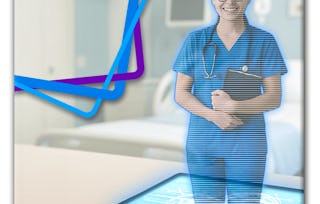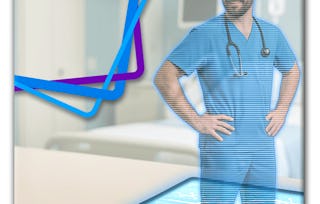This 7-week course provides you with key strategies to help understand the foundation of Clinical Simulations. During each module, you will learn about 7 key components of Clinical Simulation Across the Health Professions and its' impact in your current position as a healthcare professional. Please utilize all of the Resources provided by each of the modules to support and enhance your understanding of each concept. You will learn about the following topics in this course:

Essentials in Clinical Simulations Across the Health Professions

Essentials in Clinical Simulations Across the Health Professions



Instructors: Pamela R. Jeffries
26,546 already enrolled
Included with
1,223 reviews
Recommended experience
Skills you'll gain
Details to know

Add to your LinkedIn profile
29 assignments
See how employees at top companies are mastering in-demand skills

There are 7 modules in this course
This module will provide information on creating clinical simulations and foundational basics when a health professional educator is considering the use of simulation pedagogy into a course, program, and/or curriculum. Based on a building analogy, the learner will navigate the steps of getting started using the simulation pedagogy outlining major steps, basic fundamentals, and considerations to “get started.” In addition as an educator adopts this use of this pedagogy, major activities, concepts, a simulation theory, and research findings are discussed so the foundation of your simulation program is grounded in theory and best practices that can lead to policy implications for your simulation center.
What's included
4 videos4 assignments2 discussion prompts
During this module, you will learn about the historical perspectives in the development of the INACSL Standards of Best Practice: Simulation and the template which is consistent across each standard. We will discuss the importance (the WHY) of the standards in simulation-based education as guideposts in developing your simulation program. As we progress through each video, you will learn about each standard (The WHAT) with in-depth descriptions of criteria to meet the standard (the HOW). You will be able to identify where your simulation program is, relative to the standards. The module concludes with you developing a plan for implementation of the INACSL Standards of Best Practice: Simulation.
What's included
4 videos4 assignments3 discussion prompts
This module will provide information on best practices in the implementation of simulation in a course, program and/or curriculum. The learner will be introduced to the concept of a strategic vision for integration involving all stakeholders and a plan for assessment and evaluation. A six-step approach to curricular development is presented. In addition, learners are introduced to key simulation concepts, methodologies, and educational strategies.
What's included
2 videos3 assignments1 discussion prompt
Implementation of a simulation center is full of complex issues including staff, faculty, simulation scenario development, professional development, budget, equipment, assets, supplies, and much more. This module will provide information to begin the development of a simulation center that meets the standards of best practice for simulation operations. It will provide strategic thinking related to budgeting, revenue, equipment and assets. This is an introduction to center development and is not a comprehensive course.
What's included
5 videos4 assignments1 discussion prompt
This module provides an introduction to simulation debriefing. It includes information about how to facilitate debriefing, common simulation debriefing methods and the role of feedback in debriefing. In session one, a history of debriefing will be reviewed. The INACSL Standards of Best Practice: Simulation Debriefing will be reviewed, and the role of feedback will be presented. Session two includes several communication strategies that are important with debriefing. Finally, session three presents information about common healthcare debriefing methods.
What's included
3 videos4 assignments7 discussion prompts
In simulation evaluation, beginning with the end in mind is critical. Why was the simulation scenario written in the first place? What need is this simulation filling within your program? Or, if simulation is already being used, is some modification needed to get your simulation or course where you want it to be? Is my simulation program contributing to improved patient care, higher test scores for learners? Evaluations provide useful data for educators, deans, hospital administrators, stake holders, funding agencies, and yes, even the learners themselves. This module will introduce you to Kirkpatrick’s 4 Levels of Evaluation, a commonly used framework in simulation. We will consider some current existing tools to evaluate simulation experiences and facilitators. And we will provide suggestions for ways to evaluate your simulation program. A word about translating this evaluation approach to your own culture. My approach to evaluation is a very western model. Please consider what I say here and adapt this to fit with your own country or cultural approach to evaluation. Begin with the end in mind- as you start a simulation program. Evaluation is continuous and ongoing…we can evaluate the scenarios, teaching or facilitation of a scenario, student outcomes, etc.
What's included
4 videos2 readings5 assignments4 discussion prompts
Welcome to Module 7: SPs and Simulation. This module consists of four sessions. We will start this session by clarifying the term SP and introducing the Association of Standardized Patient Educators (ASPE) Standards of Best Practice (SOBP) which will be referenced throughout all of the sessions. Then I will discuss the role and function and SPs in simulation. The second session will focus on developing SP scenarios or cases. The third session will focus on recruiting SPs and training them for role portrayal. In the last session, I will discuss SP program management and opportunities for professional development for those training SPs and administering SP activities. So let’s get started.
What's included
4 videos5 assignments2 discussion prompts
Instructors



Offered by
Explore more from Healthcare Management
 Status: Free Trial
Status: Free Trial Status: Free Trial
Status: Free Trial Status: Free Trial
Status: Free Trial Status: Free Trial
Status: Free Trial
Why people choose Coursera for their career

Felipe M.

Jennifer J.

Larry W.

Chaitanya A.
Learner reviews
- 5 stars
80.29%
- 4 stars
17.25%
- 3 stars
2.12%
- 2 stars
0.32%
- 1 star
0%
Showing 3 of 1223
Reviewed on Feb 25, 2021
Great course!Some of the web links and references did not work. I could not access the information that I was supposed to . This course covered everything in detail!
Reviewed on May 13, 2022
Found the course very informative. I especially liked the sections on debriefing. I'm always looking to improve on my debriefing skills because it is so important. Thank you!
Reviewed on Feb 24, 2021
Excellent course with relevant content, great advice on managing simulation programs, and thoughtful questions to make the student think about how best to implement evidence-based simulation.

Open new doors with Coursera Plus
Unlimited access to 10,000+ world-class courses, hands-on projects, and job-ready certificate programs - all included in your subscription
Advance your career with an online degree
Earn a degree from world-class universities - 100% online
Join over 3,400 global companies that choose Coursera for Business
Upskill your employees to excel in the digital economy
Frequently asked questions
To access the course materials, assignments and to earn a Certificate, you will need to purchase the Certificate experience when you enroll in a course. You can try a Free Trial instead, or apply for Financial Aid. The course may offer 'Full Course, No Certificate' instead. This option lets you see all course materials, submit required assessments, and get a final grade. This also means that you will not be able to purchase a Certificate experience.
When you purchase a Certificate you get access to all course materials, including graded assignments. Upon completing the course, your electronic Certificate will be added to your Accomplishments page - from there, you can print your Certificate or add it to your LinkedIn profile.
Yes. In select learning programs, you can apply for financial aid or a scholarship if you can’t afford the enrollment fee. If fin aid or scholarship is available for your learning program selection, you’ll find a link to apply on the description page.
More questions
Financial aid available,





